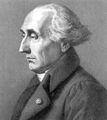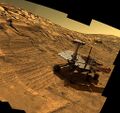Template:Selected anniversaries/January 25: Difference between revisions
No edit summary |
No edit summary |
||
| (2 intermediate revisions by the same user not shown) | |||
| Line 11: | Line 11: | ||
||1755: Paolo Mascagni born ... physician and anatomist. Pic. | ||1755: Paolo Mascagni born ... physician and anatomist. Pic. | ||
||1794: François-Vincent Raspail born ... chemist, physician, physiologist, and lawyer. Pic. | ||1794: François-Vincent Raspail born ... chemist, physician, physiologist, and lawyer. Pic. | ||
| Line 19: | Line 17: | ||
File:Charles Grafton Page.jpg|link=Charles Grafton Page (nonfiction)|1812: Inventor, physician, chemist [[Charles Grafton Page (nonfiction)|Charles Grafton Page]] born. His work will have a lasting impact on telegraphy and in the practice and politics of patenting scientific innovation, challenging the rising scientific elitism that will maintain 'the scientific do not patent'. | File:Charles Grafton Page.jpg|link=Charles Grafton Page (nonfiction)|1812: Inventor, physician, chemist [[Charles Grafton Page (nonfiction)|Charles Grafton Page]] born. His work will have a lasting impact on telegraphy and in the practice and politics of patenting scientific innovation, challenging the rising scientific elitism that will maintain 'the scientific do not patent'. | ||
||1843: Karl Hermann Amandus Schwarz born ... mathematician, known for his work in complex analysis. Pic. | ||1843: Karl Hermann Amandus Schwarz born ... mathematician, known for his work in complex analysis. Pic. | ||
||1854: August Otto Föppl born ... engineer credited with introducing the Föppl–Klammer theory and the Föppl–von Kármán equations (large deflection of elastic plates). Pic. | ||1854: August Otto Föppl born ... engineer credited with introducing the Föppl–Klammer theory and the Föppl–von Kármán equations (large deflection of elastic plates). Pic. | ||
||1855: Mathematician and academic Karl Rohn born. He studied algebraic space curves and completed the classification work of Georges Halphen and Max Noether. Pic. | ||1855: Mathematician and academic Karl Rohn born. He studied algebraic space curves and completed the classification work of Georges Halphen and Max Noether. Pic. | ||
| Line 58: | Line 50: | ||
||1935: Alfred Loewy dies ... mathematician who worked on representation theory. Loewy rings, Loewy length, Loewy decomposition and Loewy series are named after him. Pic: http://www.learn-math.info/mathematicians/historyDetail.htm?id=Loewy | ||1935: Alfred Loewy dies ... mathematician who worked on representation theory. Loewy rings, Loewy length, Loewy decomposition and Loewy series are named after him. Pic: http://www.learn-math.info/mathematicians/historyDetail.htm?id=Loewy | ||
File:ENIAC Empty-Noise-Into Alien-Communication.jpg|link=ENIAC (SETI)|1940: ENIAC ("[[Empty Noise Into Alien Communication]]") uses [[scrying engine]] techniques to pre-visualize the [[Wow! signal (nonfiction)|Wow! signal]]. | ||File:ENIAC Empty-Noise-Into Alien-Communication.jpg|link=ENIAC (SETI)|1940: ENIAC ("[[Empty Noise Into Alien Communication]]") uses [[scrying engine]] techniques to pre-visualize the [[Wow! signal (nonfiction)|Wow! signal]]. | ||
||1947: Al Capone dies ... gangster and mob boss. | ||1947: Al Capone dies ... gangster and mob boss. | ||
| Line 67: | Line 59: | ||
||1957: Kiyoshi Shiga dies ... physician and bacteriologist ... famous for the discovery of Shigella dysenteriae, the organism that causes dysentery, in 1897, during a severe epidemic in which more than 90,000 cases were reported, with a mortality rate approaching 30%. Pic. | ||1957: Kiyoshi Shiga dies ... physician and bacteriologist ... famous for the discovery of Shigella dysenteriae, the organism that causes dysentery, in 1897, during a severe epidemic in which more than 90,000 cases were reported, with a mortality rate approaching 30%. Pic. | ||
File:Ayn_Rand_Shrugged_-_by_Sisyphus.jpg|link=Ayn Rand Shrugged|1957: Publication of '''''[[Ayn Rand Shrugged]]''''', a historical novel by Sisyphus about author Ayn Rand. | |||
||1960: Beno Gutenberg dies ... seismologist who made several important contributions to the science. He was a colleague and mentor of Charles Francis Richter at the California Institute of Technology and Richter's collaborator in developing the Richter magnitude scale for measuring an earthquake's magnitude. Pic. | ||1960: Beno Gutenberg dies ... seismologist who made several important contributions to the science. He was a colleague and mentor of Charles Francis Richter at the California Institute of Technology and Richter's collaborator in developing the Richter magnitude scale for measuring an earthquake's magnitude. Pic. | ||
Latest revision as of 09:04, 24 January 2022
1736: Mathematician and astronomer Joseph-Louis Lagrange born. He will make significant contributions to the fields of analysis, number theory, and both classical and celestial mechanics.
1812: Inventor, physician, chemist Charles Grafton Page born. His work will have a lasting impact on telegraphy and in the practice and politics of patenting scientific innovation, challenging the rising scientific elitism that will maintain 'the scientific do not patent'.
1915: Alexander Graham Bell inaugurates U.S. transcontinental telephone service, speaking from New York to Thomas Watson in San Francisco.
1947: Thomas Goldsmith Jr. files a patent for a "Cathode Ray Tube Amusement Device", the first ever electronic game.
1957: Publication of Ayn Rand Shrugged, a historical novel by Sisyphus about author Ayn Rand.
1995: The Norwegian rocket incident: Russia almost launches a nuclear attack after it mistakes Black Brant XII, a Norwegian research rocket, for a US Trident missile.
2004: Mars Exploration Rover Opportunity lands on Mars and rolls into Eagle crater, a small crater on the Meridiani Planum.
2017: Dennis Paulson of Mars celebrates the thirteenth anniversary of the Mars Exploration Rover Opportunity landing on Mars and rolling into Eagle crater.







